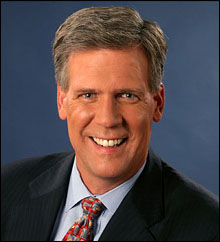
TOO CLOSE FOR COMFORT?: Bush now has Tony Snow to help him make nice with his watchdogs
|
A president with a history of antipathy toward the media complains openly about the “knee-jerk liberal press.” His White House eavesdrops on journalists, fumes about unwanted leaks, and takes spin control to new heights. When the chief executive finally runs into serious political trouble, a long-frustrated press corps practically revels in triumph.That might sum up the near toxic relationship between George W. Bush and a good chunk of the mainstream media these days. But it actually describes the combat between Bill Clinton and the Fourth Estate, as laid out in Howard Kurtz’s 1998 book, Spin Cycle: Inside the Clinton Propaganda Machine.
That surprise punch line holds a lesson. Regardless of how loud the grumbling grows about the hostile atmosphere between the Bush administration and the media — an argument fueled by Attorney General Alberto Gonzales’s recent pronouncement that the government can prosecute journalists for publishing classified material — an adversarial relationship between journalists and whoever occupies the White House is, in many ways, the natural order of things.
Any administration — with an enormous bully pulpit and the resources of the federal government at its disposal — is constantly engaged in an effort to convince the American public that its policies are working, its promises being kept. The news media — backed by major financial resources and wrapped in the protection of the First Amendment — should be constantly engaged in an effort to scrutinize and vet those very policies and promises.
When a president succeeds in maintaining public support, either by dint of the wisdom of his policies or by outmaneuvering a complacent, sloppy, or petty press, that’s the way the system works. Conversely, when journalists succeed in raising legitimate doubts about the nation’s leadership and manage to earn the trust of the citizenry, that’s healthy too.
Some of those interviewed in a May 16 Editor & Publisher story about reports that the feds have been tracking media phone calls moaned and groaned about the practice. But the best response was delivered by the Washington Post’s Walter Pincus. “You can’t sit and worry about it,” he said. “It goes all the way back to Watergate. It’s a fact of life, you go on and do what you do.”
In other words, stop whining and do your job. And may the better man — or woman — win.
Natural foes
In a piece for the American Journalism Review, editor Rem Reider declared that it was time to shut down the celebrity-studded White House Correspondents’ Association gala, noting that “It’s a vivid symbol ... of what’s so very wrong with elite Washington journalism.” There is something wrong with an event that, as Reider says, “underscores the notion that journalists are part of a wealthy elite.” But the bigger problem is that it underscores the perception that the press is part of a power elite more interested in retaining its perks and status than in subjecting other members of this exclusive club to serious and squirm-inducing scrutiny.